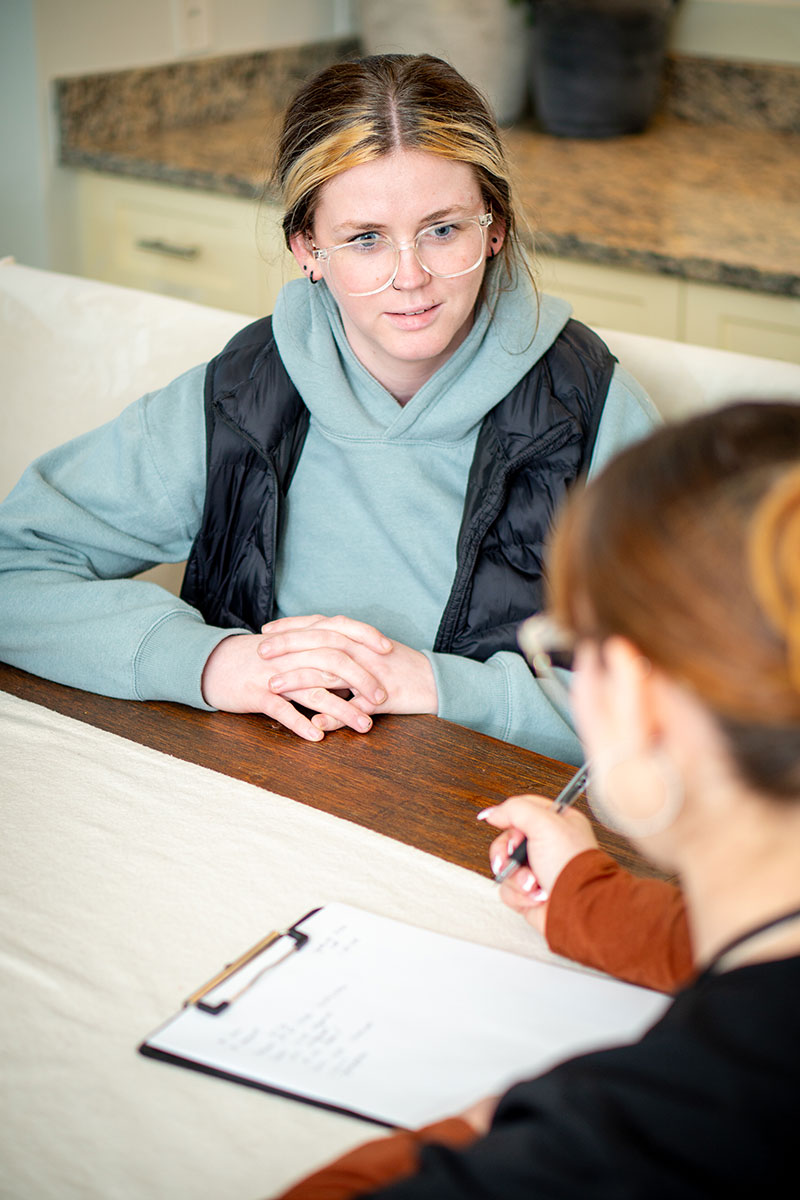 Every day, someone somewhere is commenting on how they need to straighten their desk because they’re “so OCD.” The trouble is, cleaning a desk because it’s dirty and suffering from a mental illness are two completely separate situations. You can deal with one of those issues on your own. But the other is a whole mental health disorder that is difficult to treat. So what exactly is OCD, and why is it more complicated than being extra tidy? How can women who are suffering from OCD and addiction get the help they need?
Every day, someone somewhere is commenting on how they need to straighten their desk because they’re “so OCD.” The trouble is, cleaning a desk because it’s dirty and suffering from a mental illness are two completely separate situations. You can deal with one of those issues on your own. But the other is a whole mental health disorder that is difficult to treat. So what exactly is OCD, and why is it more complicated than being extra tidy? How can women who are suffering from OCD and addiction get the help they need?
What is OCD?
Obsessive-compulsive disorder (OCD) is a general anxiety disorder that causes those who suffer from it to have recurring thoughts that result in fear and anxiety. Frequent hand-washing, obsessive organization, touching things for no known reason, and counting items are all a part of the compulsive behaviors that make up OCD.
When someone with OCD performs these compulsive tasks, it puts their minds at ease. The anxiety, however, slowly creeps back in once the task has been finished. People looking for treatment for OCD often display behavior that is mentally destructive and also a hindrance to their quality of life.
What Are the Four Types of OCD?
Each person’s OCD can’t be classified in a definitive list. Characteristics of the disorder are often unique to each individual. However, four common dimensions of OCD include:
- Forbidden thoughts
- Contamination
- Perfection
- Doubt/harm
How OCD Affects Women
Men and women are similar in many ways, yet in many ways they’re different. As it relates to people with OCD, there is no indication that there is more prevalence in one than the other. There are, however, variables as it relates to both of the genders in regards to OCD. This mental health disorder presents itself more in males during childhood or adolescence. Females typically develop OCD in their twenties.
The Reality of OCD
One of the worst parts of suffering from a mental health disorder is when it’s been made out to be a joke (self-deprecating humor included) or it’s idolized. OCD is a disorder that shows up frequently on television and in movies. The characters who are portrayed as obsessive are obsessive in such a way that it’s meant to be humorous, unique, or horrifying.
Is OCD a Form of Addiction?
Since addiction is a compulsive disorder, someone with obsessive-compulsive disorder is more likely to develop an addiction. People with OCD symptoms experience a high level of anxiety every second of the day.
In extreme cases, treatment for OCD is necessary. The torment they experience is real and is difficult to control. Their life has been compromised in a way that affects their job, education, romantic life, family, and social development negatively. One of the most unfortunate parts about this is that, sometimes, individuals believe that the best way to cope with their OCD is to use alcohol and drugs.
How is OCD Different From Addiction?
If someone is prone to addiction it does not absolutely mean the individual has OCD. Similarly, if someone has OCD, it does not always mean they will suffer from addiction. The two disorders are different and have different characteristics. However, some characteristics of OCD and addiction tend to overlap.
Are People With OCD More Likely to Have Addiction?
The number of individuals looking for OCD and substance use treatment is somewhere above 25%. Those who dealt with symptoms of OCD at an early age are more likely to develop substance use disorders. The reason for this is because if they do so, it becomes easier to cope with the anxiety that follows. This is why it’s imperative to treat both disorders while also addressing the symptoms of OCD and addiction.
OCD and Anxiety
Dealing with anxiety is a tough pill to swallow, and for those who suffer from OCD, anxiety comes along with the disorder, often because of it. To cope, people may start abusing drugs and alcohol. The problem with this is that these substances worsen the symptoms of obsessive-compulsive disorder.
What is Addiction?
 Addiction is when someone has a biopsychosocial disorder, often resulting in them feeling an obsessive desire to repeatedly use drugs or alcohol, regardless of how it affects those around them. The brain desires to use more and more drugs or alcohol, resulting in abuse, not thinking twice about what it could do to the body.
Addiction is when someone has a biopsychosocial disorder, often resulting in them feeling an obsessive desire to repeatedly use drugs or alcohol, regardless of how it affects those around them. The brain desires to use more and more drugs or alcohol, resulting in abuse, not thinking twice about what it could do to the body.
Those who suffer from substance abuse usually can’t stop thinking about their next drink. This is fixated on and obsessed over to the point where it takes over their life. The obsession is to the point where the individual doesn’t even care about what problems drug abuse can cause. There are many different kinds of drug or alcohol addiction treatment programs available to help those suffering from substance abuse.
Some of the most common addictions include the following:
What Addiction Does to the Body
Those who develop addictions begin to form distorted minds due to what the substances do to their brains. When people use drugs or alcohol, chemicals travel to the pleasure center in the brain. This causes the brain to lose interest in things that used to bring a person pleasure and instead develops a desire for a more intense high. The problem with this is that there is no high stronger than the first.
Addiction and Anxiety
The combination of addiction and anxiety is absolutely problematic. Suffering from anxiety is not easy, and those who suffer deal with real fear regularly that have an impact both emotionally and physically. More often than not, people will turn to alcohol as a coping mechanism because alcohol does a great job at shutting off thoughts that have that kind of impact on the body.
Those who suffer from anxiety are more likely to use dangerous coping mechanisms like alcohol abuse or drug abuse. This is dangerous because it has the potential to lead to a substance use disorder. Addiction, like OCD, is compulsive and therefore motivates a person to pursue destructive behaviors repetitively regardless of the consequences.
OCD: Statistics and Information
Obsessive-compulsive disorder has a monumental impact on the lives of those it latches onto. Below are some facts regarding OCD:
- More than 2 million men and women in the U.S. suffer from OCD.
- Substance use disorder, depression, and anxiety co-occur with OCD frequently.
- Even though someone may realize their behavior is irrational, they can’t help but continue to engage in obsessive behavior.
Signs of OCD
Different individuals deal with their illnesses in different ways, and that’s probably because the intensity of an individual’s OCD is largely dependent on how they are made up. However, some signs and symptoms can be looked out for as identifiers of OCD. Some of these obsessions include:
- Getting sick
- Losing a loved one
- A loved one feeling sick
- Fear of exposure to a virus or bacteria
- Religious topics
- Fear of injury
When it comes to other common behaviors, some are a little bit more obvious to the naked eye. Some of these include obsessive grooming, organizing, cleaning, or counting. The obsession lies within the thought pattern that if they don’t do these things repeatedly, they’ll be harmed, or someone they love will be harmed. Some individuals believe that if they don’t do these things repeatedly, they’ll hurt another person.
Dual Diagnosis
 When someone is suffering from both obsessive-compulsive disorder and substance abuse, it’s referred to as a dual diagnosis, also known as a co-occurring disorder. In layman’s terms, dual diagnosis is when two disorders happen at the same time. When two or more disorders overlap like this, it’s in the best interest of those who are suffering to seek out and receive specialized care. This is because there is a sense of urgency that comes along with having two mental health disorders at once.
When someone is suffering from both obsessive-compulsive disorder and substance abuse, it’s referred to as a dual diagnosis, also known as a co-occurring disorder. In layman’s terms, dual diagnosis is when two disorders happen at the same time. When two or more disorders overlap like this, it’s in the best interest of those who are suffering to seek out and receive specialized care. This is because there is a sense of urgency that comes along with having two mental health disorders at once.
Self-medication is a way in which people who are suffering from a mental health disorder tend to cope. The way they do this is by abusing drugs and alcohol so that they can feel better about what they’re going through. However, regardless of their intentions, this method is objectively bad because it makes people a lot worse off, increasing the likelihood of a substance use disorder.
In the U.S., 9 million adults dealt with mental illnesses in 2018. When it comes to a dual diagnosis, one disorder doesn’t have to happen for another to show up, they just have to be happening at the same time. That’s not to say, however, that addiction can’t trigger a nonexistent disorder. Some mental health disorders that co-occur with addiction include:
Those who deal with substance use disorders are twice as likely to develop a mental illness as those who don’t. There are also times, however, that someone could be suffering from an addiction as a direct result of their mental illnesses, but as previously mentioned, this is not always the case.
OCD and Addiction
OCD is a mental disorder that can be made even worse with an addiction. People with obsessive-compulsive disorder may feel the urge to turn to drugs and alcohol to mitigate their OCD symptoms. Unfortunately, addiction can actually make their symptoms even worse. Substance abuse can intensify obsessions and compulsions and make you spiral even deeper into OCD and substance use.
Treatment Options
 Obsessive-compulsive disorder and addiction are both mental illnesses that should never go without treatment. There are treatment options available for those who are looking for temporary relief and even long-term recovery. Some of these include the following:
Obsessive-compulsive disorder and addiction are both mental illnesses that should never go without treatment. There are treatment options available for those who are looking for temporary relief and even long-term recovery. Some of these include the following:
- Therapy
- Support groups
- Inpatient Treatment
- Intensive Outpatient Treatment
- Medically Assisted Treatment (MAT)
New Directions for Women is Here to Help
Obsessive-compulsive disorder (OCD) is one of the most widely referenced mental illnesses in society. Whether it’s meant to be a joke or being idolized by TV, this disorder is nothing to take lightly. Obsessive-compulsive disorder and addiction are challenging disorders to deal with and often require co-occurring disorder treatment. OCD and substance use should be tended to immediately.
At New Directions for Women, we specialize in treating our clients uniquely, because we recognize that they all come with their own stories. We are committed to providing individualized treatment to every woman who walks through our doors. If you or a loved one are suffering from OCD or a substance use disorder, call us today.










